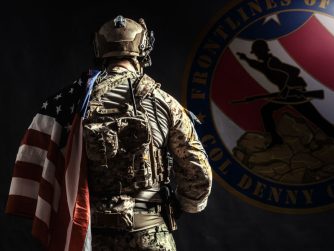NATO—the North Atlantic Treaty Organization, has been our primary military alliance since right after WWII. During the Cold War period, which was the conflict between the Soviet Union and its satellites and the US and Western Europe, all the countries maintained large, combat ready forces in Europe—prepared to defend against a Soviet invasion. I served for three years in a mechanized infantry battalion in Germany in the mid-1970s. We were combat ready. Fortunately, we didn’t have to fight.
When Germany surrendered at the end of WWII, the nation was divided into four occupational areas—one each for the US, England, France, and the Soviet Union—the four primary waring powers. The US, England, and France allowed their areas to begin self-rule as West Germany. The Soviets maintained control of East Germany—and it was in East Germany that the German capital of Berlin was located—and the capital was itself divided into four zones; thus when the Soviets prohibited land movement—truck convoys, busses and trains—to pass through East Germany to get to West Berlin, we were confronted with what was called the Berlin Blockade. This challenge was met by the Berlin airlift which lasted for nearly a year before the Soviets saw that they were getting really bad press around the world and the West Berliners were prospering. But the Blockade made the Soviet threat very apparent.
In 1948, European leaders met exploring a a new and unprecedented association. The result was the North Atlantic Treaty. It included Belgium, the Netherlands, Luxembourg, France, the UK, the US, Canada, Portugal, Italy, Norway, Denmark and Iceland. The first NATO Secretary General, Lord Ismay, stated in 1949 that the organization’s goal was “to keep the Russians out, the Americans in, and the Germans down”.
The members agreed that an armed attack against any one of them in Europe or North America would be considered an attack against them all. Consequently, they agreed that, if an armed attack occurred, each of them, in exercise of the right of individual or collective self-defense, would assist the member being attacked, taking such action as it deemed necessary, including the use of armed force, to restore and maintain the security of the North Atlantic area.
The Cold War included such “hot” conflicts as the Korean War and the Vietnam War. But through all the hot conflicts, at no time did NATO troops fight Soviet troops—at least not that we know of.
The Soviet’s response to NATO was to form the Warsaw Pact with their satellite nations in Europe.
The Soviet Union spent itself to death—literally. One can see a parallel in our nation right now. President Obama doubled our national debt during his eight years in office—how we’re going to dig our way out of that mess, I’m not sure. Anyway, on 26 Dec 1991 the Soviet Union dissolved—folded—went away. The various nations were suddenly on their own. Yes, the Warsaw Pact ended in 1991, too.
This removed the main adversary of NATO and caused a strategic re-evaluation of NATO’s purpose and focus in Europe. At that time, European countries accounted for 34% of NATO’s military spending; by 2012, this had fallen to 21%. NATO also began a gradual expansion to include newly autonomous Central and Eastern European nations, and extended its activities into political and humanitarian situations that had not formerly been NATO concerns.
Since the end of the Cold War, NATO’s European allies have basically let their military forces fade away. The budgets shrunk severely. The UK and France have maintained some force structure, but the wealthiest nation in Europe, Germany, has let its military go to pot. All these nations working together couldn’t stop anyone. All of them have some very good special ops folks—and that’s pretty much it—except for parade-ground troops for ceremonies. Most of these nations have taken the money and used it to move into socialism—which really sounds good, but it teaches people that you don’t have to work to get something—and people learn that lesson very quickly.
And now, most of those nations have welcomed huge numbers of Muslim refugees—a great many of whom are rioting, demanding more welfare, and the establishment of Shirah Law—and many European nations are giving in to these demands. How dependable will any military be formed from nations like these? When President Trump told the NATO nations that they had to get their militaries up to speed and to honor their commitment to the NATO treaty, many were upset with him. They get even more upset when he pulled out of the Global Warming deal. And these are our allies. Feel safe? Me, neither.
Oh, and Russia has large, well trained and equipped military forces in the Scandinavian area. Might Russia be thinking about invading—like they did in the Ukraine? I do think that that’s their plan. Can these NATO nations defend against such an invasion? No, they can’t. And our military is shrinking, too, so I’m not sure how much we can or should help them if this happens. Our world is really, really unsafe.



